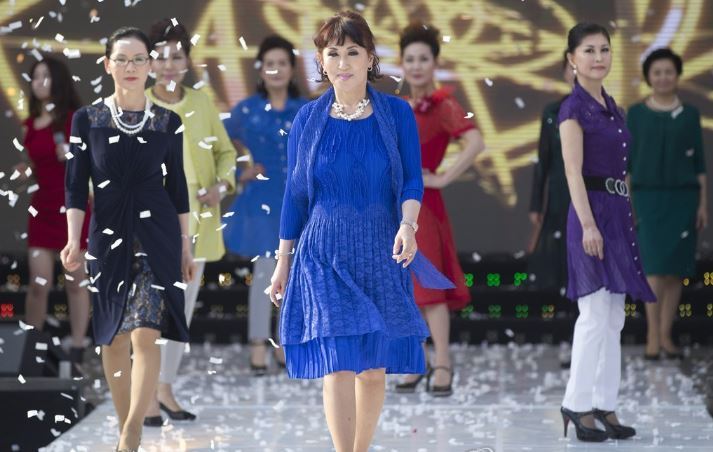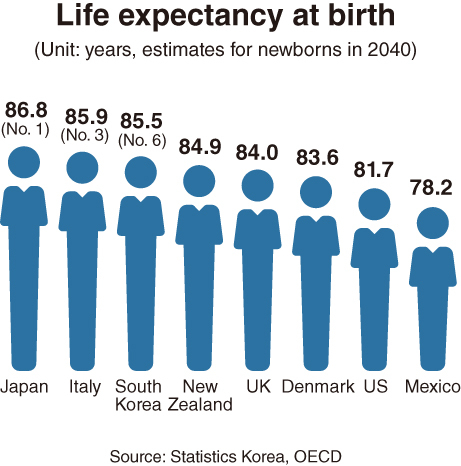 |
A senior fashion show is held at the Seoul Arts Center in Seocho-dong, Seoul, where 50 percent of the contestants were aged 65 or over. (Yonhap) |
SEJONG -- South Korea ranked No. 10 in people’s life expectancy at birth among the 37 members of the Organization for Economic Cooperation and Development in its 2019 comparison.
The Paris-based organization defined life expectancy at birth as how long, on average, a newborn can expect to live, if current death rates do not change. Korean newborns are estimated to live 82.7 years on average.
Though Korea saw the average life span has become quite longer compared to 1970-1980s, the figure is lagging behind neighboring Japan and some developed countries.
Japan topped the list in life expectancy at birth with 84.2 years, followed by Switzerland with 83.8, Spain with 83.5, Italy with 83.4, Iceland with 82.9 and Israel with 82.9. Three others -- France, Australia and Norway -- also outstripped Korea at 82.8.
Nonetheless, Korea ranked above the US (78.7 years), Germany (81), Denmark (81), the UK (81.3), New Zealand (81.8), Greece (81.9), the Netherlands (81.9), Canada (82) and Sweden (82.6).
Korea’s growth pace in life span is among the fastest in the 37 OECD members.
 |
(Graphic by Yoon Jeong-soon/The Korea Herald) |
According to the OECD and Statistics Korea, the nation is projected to rank sixth, alongside Iceland, in 2040 by overtaking three countries over the next two decades.
Korean newborns are expected to see their life expectancy reach 85.5 years in 2040, when the figures for Israel, France and Norway are expected to be 85.4, 85.1 and 84.9, respectively.
After exceeding 86 years in 2045, the figure for Korean newborns would continue to climb to 86.7 years in 2050, 87.3 in 2055, 87.9 in 2060, 88.5 in 2065 and 89.1 in 2070, according to forecast by Statistics Korea.
In the growth pace of its senior population since 2000 among the OECD members, Korea placed second.
Korea saw the portion of seniors -- aged 65 or over -- of the entire population stand at 7.22 percent in 2000. But the figure climbed by 7 percentage points in less than two decades to 14.2 percent as of 2018.
This marked the second-steepest rise after Japan, which posted a 10.7 percentage point growth over the corresponding period.
The 7 percentage point growth in Korea far exceeded the OECD average (by 4.1 percentage points) and the world average (by 2 percentage points).
According to the Ministry of Interior and Safety, the number of Koreans aged 80 or over increased by 106 percent over the past decade -- from 979,076 (1.9 percent of the population then) in January 2011 to 2.01 million (3.8 percent of the current population) in January 2021.
As for all seniors -- those aged 65 or over -- the number came to 8.54 million (16.5 percent of the population) as of January 2021, compared to 5.51 million (10.9 percent) a decade earlier.
Amid the pace, Korea is expected to become one of eight superaged societies in the world by 2024, alongside the existing five -- Japan, Italy, Germany, Sweden and France -- and two other candidates like to ascend -- Canada and the UK.
A superaged society refers to a nation whose elderly population accounts for 20 percent or more of the entire population, according to a stipulation set by the United Nations.
During the January 2019 to January 2020 period, Korea saw the percentage of seniors in the population climb 0.8 percentage point from 14.8 percent to 15.6 percent.
The figure rose by 0.9 percentage point for the next year to 16.5 percent in January 2021, according to resident registration data held by the Interior Safety Ministry.
By Kim Yon-se (
kys@heraldcorp.com)









![[Today’s K-pop] Blackpink’s Jennie, Lisa invited to Coachella as solo acts](http://res.heraldm.com/phpwas/restmb_idxmake.php?idx=644&simg=/content/image/2024/11/21/20241121050099_0.jpg)